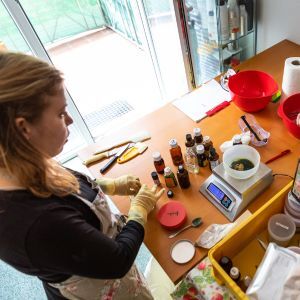The Science Behind Natural Soap Ingredients and Their Effectiveness
Eco soap isn’t just a marketing buzzword—it’s a proven way to get hands clean while keeping environmental impact low. As more New Zealand businesses look for sustainable hygiene solutions, it’s worth understanding how eco-friendly soap works and why it performs just as well as traditional options. Let’s take a closer look at what goes into commercial eco soap—whether fragranced or fragrance-free—and why it’s effective without compromise.
What Makes a Soap “Eco”?
Eco soaps are formulated with biodegradable, low-toxicity ingredients that clean effectively while being safer for the environment. They avoid harsh chemicals like triclosan, high levels of sulphates, and unnecessary additives that can irritate skin or harm waterways. Instead, they rely on plant-derived cleaning agents, moisturisers, and mild formulations that work in both high-use and sensitive environments.
Key Ingredients in Natural Soap & How They Work.
1. Plant-Based Surfactants
Surfactants are the cleaning agents in soap. In eco formulations, these are often derived from plants such as coconut, corn, or palm (sustainably sourced).
Effectiveness:
-
Lift dirt, grease, and germs from skin so they can be rinsed away
-
Gentle on skin while still providing excellent cleaning power
2. Glycerine
A natural moisturiser often retained in eco soap formulas to help prevent dryness.
Effectiveness:
-
Attracts and holds moisture in the skin
-
Helps maintain a healthy skin barrier, even with frequent washing
3. Mild Fragrances (or None at All)
Eco soaps can be fragranced with light, safe scenting agents—or left completely fragrance-free for scent-sensitive environments.
Effectiveness:
-
Fragrance-free options reduce the risk of irritation or allergic reactions
-
Lightly fragranced options create a pleasant handwashing experience without overwhelming scents
4. Conditioning Additives
Ingredients such as aloe vera or natural emollients may be included for extra skin care benefits.
Effectiveness:
-
Soothe and condition skin during frequent use
-
Support skin recovery in dry or cold environments
Eco Soap vs. Traditional Soap: The Science

Both types of soap work by breaking down oils and suspending dirt so it can be rinsed away. The difference lies in the formulation—traditional soaps may contain harsher detergents and preservatives, while eco soaps are designed to clean effectively with gentler, biodegradable ingredients that minimise environmental harm.
Are Eco Soaps Antibacterial?
Not all eco soaps are labelled as “antibacterial,” but most still remove germs effectively through proper washing technique. Some include naturally derived antibacterial agents, while others rely on the mechanical action of handwashing to reduce microbial presence.
Why Eco Soap Is Better for Businesses
-
-
Skin-Friendly: Suitable for frequent handwashing in commercial settings
-
Eco-Safe: Biodegradable and greywater-friendly formulations
-
Versatile: Available fragranced or fragrance-free to suit different workplace needs
-
Cost-Effective: Many are concentrated for bulk refill use, reducing waste and packaging
-
Insinc Insight: Eco Can Be Everyday
At Insinc, we stock a wide range of eco commercial soaps—both fragrance-free and lightly fragranced—to suit offices, schools, hospitality, healthcare, and food prep environments across New Zealand. Whether you need a gentle, compliant formula or a pleasant everyday wash for public facilities, we’ve got you covered.
FAQs
Q: Will eco soap work in my dispenser?
A: Yes—just make sure you match the type (liquid or foaming) to the dispenser style.
Q: Does fragrance-free mean no smell at all?
A: Generally, yes—though there may be a mild scent from the base ingredients.
Q: Is eco soap as effective as regular soap?
A: Absolutely. With proper handwashing technique, eco soap cleans just as well as traditional soap—without the harsh additives.
Conclusion
Eco soap combines cleaning science with environmental responsibility. By choosing fragranced or fragrance-free options to suit your workplace, you can maintain high hygiene standards, protect sensitive skin, and reduce your environmental footprint—all in one simple swap.
Posted: Monday 4 August 2025



